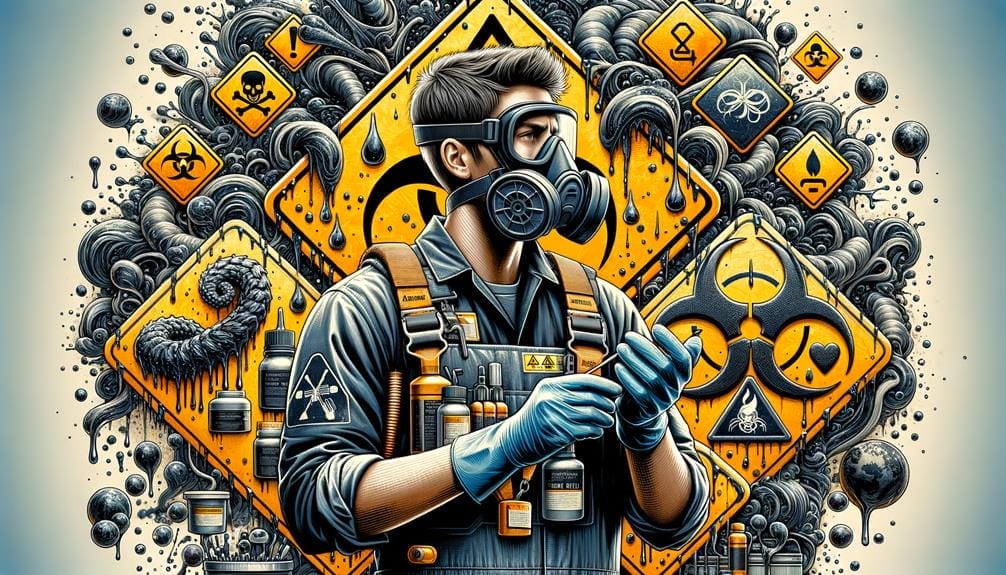Like a double-edged sword, epoxy resin can bring both beauty and potential health concerns to your projects. While it is a versatile and popular material for crafters and DIY enthusiasts, it is important to be aware of the potential risks it poses to your health.
From skin and respiratory irritation to long-term effects on human health, the hazards associated with epoxy resin cannot be ignored. In this discussion, we will explore the various health concerns related to epoxy resin, shedding light on the importance of safety measures and precautions to ensure your well-being while working with this intriguing substance.
So, let’s dive in and uncover the hidden dangers behind the mesmerizing world of epoxy resin.
Key Takeaways
- Epoxy resin can cause health problems through direct skin contact or inhalation of volatile components.
- Allergic reactions, such as contact dermatitis, can occur in less than 10% of epoxy users.
- Long-term exposure to epoxy resin may have carcinogenic properties and disrupt the endocrine system.
- Contact dermatitis and respiratory issues can result from exposure to epoxy resin, emphasizing the importance of safety precautions and protective equipment.
Potential Toxicity of Epoxy Resin
The potential toxicity of epoxy resin is a significant concern for individuals working with this material. Epoxy resin can cause various health problems, especially when there’s direct skin contact or inhalation of its hazardous volatile components. One of the most common reactions is irritation, which can manifest as acute contact dermatitis.
This condition is characterized by redness, itching, and swelling of the skin. Additionally, chronic contact dermatitis may develop over time with repeated exposure. It’s important to note that sensitization can occur when individuals become allergic to epoxy resin or its hardener. This means that even a small amount of exposure can trigger an allergic reaction, leading to more severe symptoms.
Respiratory problems are also a concern when working with epoxy resin. Breathing in highly concentrated epoxy vapor can irritate the respiratory tract and cause sensitization. This can result in respiratory symptoms such as coughing, wheezing, and shortness of breath. It’s essential to take precautions to minimize inhalation of epoxy vapor, such as wearing a respirator and working in a well-ventilated area.
Allergic Reactions to Epoxy Resin
After addressing the potential toxicity of epoxy resin, it’s important now to examine the occurrence of allergic reactions to this material.
When it comes to allergic reactions, less than 10% of epoxy users experience a reaction when they’re overexposed to epoxy resin or hardener. The most common allergic reaction to epoxy resin is contact dermatitis, which is characterized by inflammation of the skin upon contact with the resin.
Both the epoxy resin and the hardener have the potential to cause acute contact dermatitis. Although discomfort can be severe, it usually disappears after discontinuing contact with the irritant. However, it’s worth noting that repeated skin contact with resins and hardeners can lead to chronic contact dermatitis. This condition persists over time and can cause ongoing skin inflammation and discomfort.
In addition to skin reactions, it’s important to be aware that exposure to epoxy resin vapor can also result in respiratory issues.
To ensure safety, it’s recommended to refer to safety data sheets and follow appropriate precautions when working with epoxy resin to minimize the risk of allergic reactions and maintain good health.
Long-Term Effects on Human Health

Long-term exposure to epoxy resin can pose potential health risks, including cancer and endocrine disruption, as a result of the presence of BADGE. It’s important to be aware of the long-term effects on human health associated with epoxy resin. Here are three key points to consider:
- Chronic contact dermatitis: Repeated skin contact with epoxy resin and hardeners may lead to chronic contact dermatitis. This condition causes inflammation, itching, and redness of the skin. While less than 10% of epoxy users react when overexposed, sensitization to epoxy is likely to occur in less than 2% of users.
- Respiratory irritation: Inhalation of epoxy vapors can irritate the respiratory system, leading to symptoms such as coughing, wheezing, and shortness of breath. Additionally, it can trigger allergic reactions in some individuals. To minimize exposure, it’s important to wear proper respiratory protection when working with epoxy resin.
- Potential carcinogenic and endocrine-disrupting effects: Long-term exposure to BADGE, a compound found in epoxy resin, has been associated with potential health risks. Studies suggest that it may have carcinogenic properties, potentially increasing the risk of developing cancer. Furthermore, BADGE has been shown to disrupt the endocrine system, which regulates hormone production and function in the body.
Contact Dermatitis From Epoxy Resin
To discuss the potential health risks associated with epoxy resin, let’s now focus on the occurrence of contact dermatitis caused by repeated skin contact with epoxy resin and hardeners. Contact dermatitis is a common reaction that can develop when the skin comes into direct contact with epoxy products. It’s important to note that contact dermatitis is different from allergic dermatitis, which is a less common reaction that occurs when the immune system reacts to sensitizing ingredients in epoxy.
When handling epoxy resin and hardeners, it’s crucial to follow proper safety procedures to avoid skin irritation. Epoxy resin and hardener can cause severe skin irritation, especially when exposed to low pressure or warmer temperatures. The reaction may develop gradually, and the skin may become irritated or even progress to eczema. It’s essential to take precautions and protect your skin by wearing protective gloves and clothing when using epoxy.
In addition to skin irritation, exposure to epoxy vapors can also irritate your respiratory tract. Epoxy vapors can severely irritate the lining of your respiratory system and may cause respiratory irritation, red eyes, and coughing. It’s important to work in well-ventilated areas and take breaks to avoid prolonged exposure to epoxy vapors.
If you develop irritated skin or respiratory symptoms after using epoxy, it’s crucial to seek first aid and consult a medical professional. They can guide proper treatment and suggest ways to prevent future exposures. Always read the safety data sheets (SDS) for epoxy products to understand the potential hazards and take necessary precautions to protect your health.
Respiratory Irritation Caused by Epoxy Resin

Can epoxy resin cause respiratory irritation? Yes, it can. When epoxy resin is used, highly concentrated epoxy vapor is released into the air. This vapor contains reactive epoxy chemicals that can irritate your respiratory system if you breathe it in.
Here are three ways in which epoxy resin can cause respiratory irritation:
- Inhalation of highly concentrated epoxy vapor: Breathing in the vapors emitted by epoxy resin can irritate your nose, throat, and lungs. Prolonged exposure to these vapors can lead to respiratory symptoms such as coughing, wheezing, and shortness of breath.
- Sanding partially cured epoxy: Sanding epoxy that isn’t fully cured can release a significant amount of hazardous volatile compounds into the air. Inhaling these compounds can irritate your respiratory system, causing symptoms similar to those mentioned above.
- Overexposure to epoxy resin through repeated skin contact: Although respiratory irritation primarily occurs through inhalation, repeated skin contact with epoxy resin can also contribute to the development of respiratory problems. This is because some of the chemicals in epoxy resin can be absorbed through the skin and reach the respiratory system, leading to irritation and potentially more severe health issues.
If you experience respiratory irritation after using epoxy resin or if the irritation persists or worsens, it’s important to seek medical attention. Taking proper precautions and using protective equipment when working with epoxy resin can help minimize the risk of developing respiratory problems.
Frequently Asked Questions
What Are the Long-Term Effects of Epoxy Exposure?
Long-term exposure to epoxy can result in various health effects. These include skin irritation, respiratory problems, allergic reactions, eye irritation, neurological effects, organ damage, carcinogenic potential, reproductive health risks, immunotoxicity concerns, and chronic health implications.
How Long Are Epoxy Resin Fumes Toxic?
Epoxy resin fumes are toxic during the curing process, so proper ventilation is essential to minimize health risks. Follow safety precautions, consider alternative options, and dispose of epoxy resin according to guidelines to ensure your well-being.
Do You Need to Wear a Mask When Using Epoxy Resin?
When using epoxy resin, it is recommended that you wear a mask for respiratory protection. This is to minimize health risks associated with inhalation hazards. Safety precautions, such as proper ventilation and personal protective equipment, should also be followed to prevent allergic reactions and skin contact.
Is Epoxy Resin Safe to Use Indoors?
Yes, epoxy resin is generally safe to use indoors. However, it is important to ensure proper indoor ventilation, use epoxy resin alternatives if desired, and take necessary safety precautions to minimize health risks associated with fumes and potential impacts on the respiratory system. It is also important to be aware of any allergies or sensitivities to epoxy resin and to avoid skin contact. Additionally, it is crucial to dispose of epoxy waste properly and to consider the safety of pets and children in the vicinity.
Conclusion
In conclusion, it’s important to be aware of the potential health concerns associated with epoxy resin.
Overexposure to epoxy resin can lead to skin and respiratory irritation, with the possibility of developing contact dermatitis or allergic reactions.
Long-term effects on human health may also occur.
Therefore, it’s crucial to take appropriate safety precautions, such as using personal protective equipment and working in a well-ventilated area, to minimize the risks of epoxy resin exposure.





